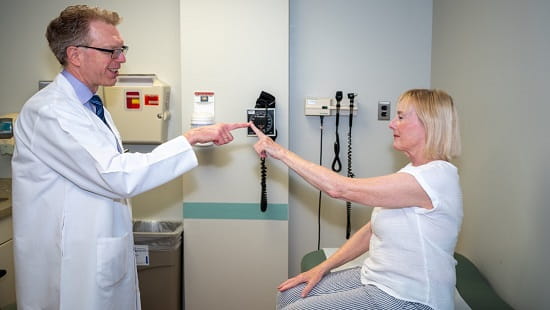Parkinson's Disease

F. Rainer Von Coelln, MD, treats a movement disorders patient at UMMC.
Parkinson’s disease is a condition of the nervous system (brain and nerves) that gradually gets worse over time.
In people with Parkinson’s disease, cells die in one area of the brain (called the substantia nigra) and the brain doesn’t make enough of the chemical dopamine. These changes can cause movement issues throughout the body.
If you or a loved one need help with a Parkinson's disease diagnosis or managing symptoms, UMMC's expert movement disorder team can help.
Choose UMMC for Parkinson's Disease Care
UMMC stays on the leading edge of Parkinson’s research and treatments.
Our experienced specialists can help you get answers if you have symptoms similar to Parkinson’s disease but no diagnosis. We’ll conduct an examination and testing when appropriate.
We provide a variety of ways to care for Parkinson’s disease and its symptoms, depending on their severity. We offer advanced treatment options, including deep brain stimulation, which can be highly effective.
We also offer clinical trials, so you have access to the latest emerging Parkinson’s treatment options. Our researchers are leaders in their field and continuously contribute to advancing Parkinson’s disease treatment.
Parkinson's Disease Signs and Symptoms
The early signs and symptoms of Parkinson’s disease may include reduced facial expressions and a softer voice, slowed movements, stiffness, trouble walking and tremor (shaking), particularly on one side of the body when the body is at rest.
As Parkinson's disease gradually worsens, symptoms progress and change depending on the stage (see details of Parkinson's disease stages below). Later stage symptoms include difficulty with memory or thinking, frozen gait or feeling like your feet are stuck to the floor, trouble with balance, difficulty swallowing, trouble communicating, constipation and/or urinary problems.
Diagnosing Parkinson's Disease
There’s no specific test to confirm Parkinson’s disease. If you’re having symptoms, your doctor will talk to you and your family about your symptoms and health history and conduct a physical exam. The doctor may order imaging tests – such as a CT scan or MRI – to rule out other health conditions that could cause your symptoms.
If your doctor thinks you may have Parkinson’s disease, they’ll likely refer you to a neurologist. It’s important to see a neurologist for a definitive diagnosis to rule out diseases similar to Parkinson’s, such as parkinsonism or non-Parkinson’s movement disorders.
There is a brain scan for people with a tremor to determine if they have a disease in the Parkinson family or if their tremor could be related to a different disease called “familial essential tremor.” Called a DaT (dopamine transporter) scan, it is only used in certain situations and is not for everyone who might have Parkinson's disease.
Stages of Parkinson's Disease
Parkinson’s disease has five stages:
- Stage One – At first, you may experience mild symptoms that don’t interfere with your daily life. These include a mild tremor and movement symptoms on one side of your body, and changes in walking, facial expressions and posture.
- Stage Two – As symptoms progress, you may experience increasing tremors, stiffness and other movement issues that now affect both sides of your body, as well as your neck and torso. Completing daily tasks is still possible but takes longer.
- Stage Three – This is mid-stage Parkinson’s disease. You’ll have problems keeping your balance and may fall often. Completing daily tasks is increasingly difficult.
- Stage Four – Symptoms are advanced and cause serious disability. You still may be able to walk and stand by yourself, but should use a cane or walker for your safety. You’ll need help every day with “regular” life activities.
- Stage Five – In this most advanced stage, you’ll have so much stiffness in your legs it may be impossible to walk and stand. Around-the-clock care is necessary.
Parkinson's Disease Treatment
An experienced movement-trained neurologist can help you find the best treatment options to manage your symptoms.
Learn more about the different treatments you can get at UMMC.
Make an Appointment
If you or a loved one has Parkinson's symptoms or a diagnosis, call us at 410-328-4323 to make an appointment with one of our specialists.
